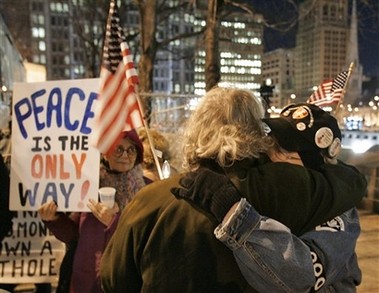this diary is dedicated to all who suffer because of war
we love and support our troops, just as we love and support the Iraqi people – without exception, or precondition, or judgment
we have no sympathy for the devil.
we acknowledge the power to act that is in us
image and poem below the fold
Iraq war protesters Jenny Hanniver, right, and Celeste Zappala embrace during a peace vigil outside Philadelphia City Hall on Tuesday, Jan. 2, 2007. Zappala’s son, Sherwood Baker, was killed in an explosion in Baghdad in April, 2004. Observing the Iraq war milestone of 3,000 U.S. dead, the Brandywine Peace Community and others sponsored the candlelight vigil and bell-tolling for peace and all those who have died in the conflict, both American and Iraqi.
(AP Photo/George Widman)
A Blessing
by James Wright
Just off the highway to Rochester, Minnesota,
Twilight bounds softly forth on the grass.
And the eyes of those two Indian ponies
Darken with kindness.
They have come gladly out of the willows
To welcome my friend and me.
We step over the barbed wire into the pasture
Where they have been grazing all day, alone.
They ripple tensely, they can hardly contain their happiness
That we have come.
They bow shyly as wet swans. They love each other.
There is no loneliness like theirs.
At home once more,
They begin munching the young tufts of spring in the darkness.
I would like to hold the slenderer one in my arms,
For she has walked over to me
And nuzzled my left hand.
She is black and white,
Her mane falls wild on her forehead,
And the light breeze moves me to caress her long ear
That is delicate as the skin over a girl’s wrist.
Suddenly I realize
That if I stepped out of my body I would break
Into blossom.
A prototypical story from the Pali Canon gives an overview of how Buddhists deal with the issue of human grief.
Kisa Gotami was a woman who had lost her first-born son. Grief-stricken and clutching the body of her deceased son, she roamed the streets looking for medicine or an antidote that could restore her son to life. She finally took the body to the Buddha.
The Buddha listened to her pleas with compassion and said, “Go enter the city, make the rounds of the entire city, beginning at the beginning, and in whatever home no one has ever died, from that house fetch tiny grains of mustard seed” (Burtt, 1982, p. 45).
Kisa Gotami went from house to house to find a mustard seed from a household untouched by death. She soon realized that the task the Buddha had set was impossible, and she brought the body of her son to the cremation grounds.
Gotami returned to the Buddha for instruction on the truth. The Buddha taught her that there is only one unchangeable law in the universe: All things are impermanent.
from Tibetan Buddhism and the resolution of grief: The Bardo-Thodol for the dying and the grieving, by Robert Goss
a personal note: I will post the next diary on January 14. If someone wants to continue the series in the meantime, please do so and leave a note here so that we can find them. Thanks.



The candle that DianeL first lit many months ago, and which has become such an important part of these diaries since, is available here, thanks to town and Maryscott O’Connor at MLW.
You can copy that image into your own comment, craft your own image, and/or rate this one – not for mojo, but to leave a small mark after taking this moment – as a sign that you know, but do not approve, and are not resigned.
Iraq civilian toll continues rise
peace
United for Peace
One effort to Silence the guns.
Rep. John Murtha (D-PA) has said he plans to deny Bush funding for troop escalation
o For the children.
For the children.